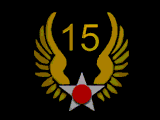|
|
T/Sgt. DUANE CORPORON
722nd Squadron
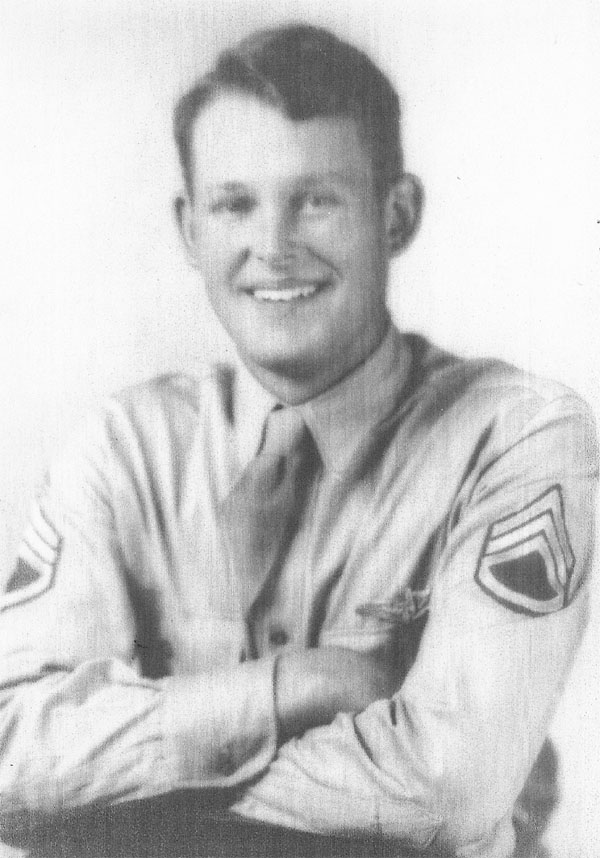
|
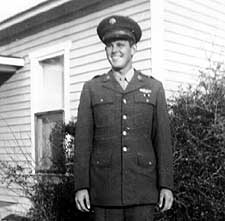
Corporal Corporon, age 20, visits home on Feb. 8, 1944.
He left for overseas shortly afterwards.
|
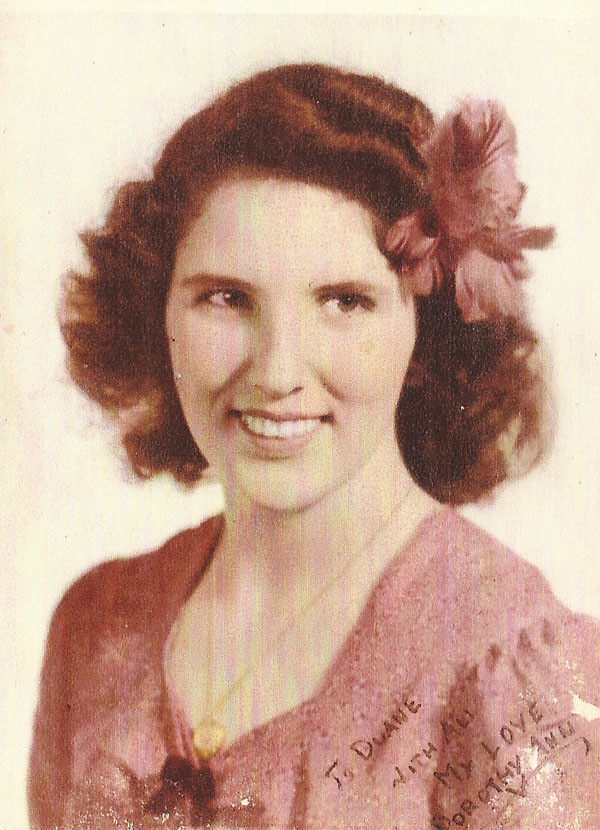
Dorothy, the love of Duane's Life
|
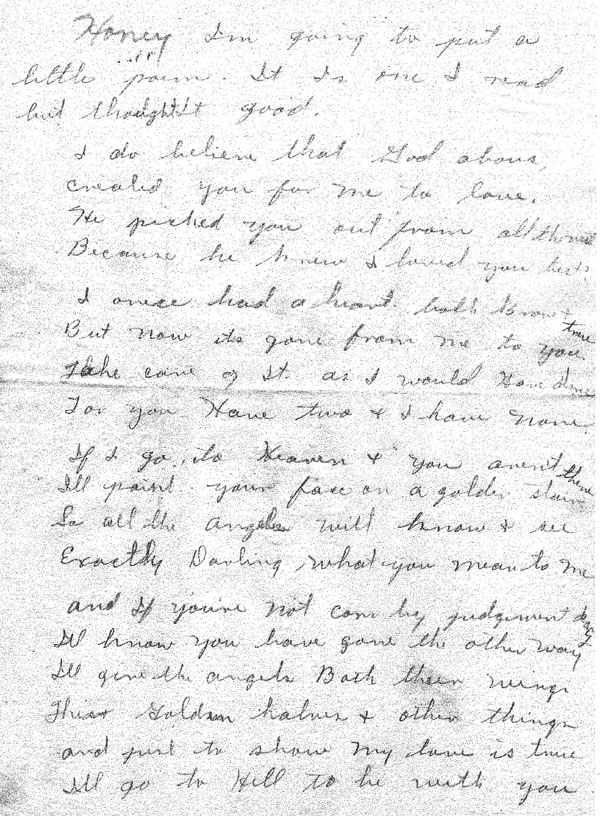
Letter Home To Dorothy
|
|
Honey,
I'm going to put a little poem. It is one I read but thought it good.
I
do believe that God above,
created
you for me to love.
He
picked you out from all the rest
because
he knew I loved you best.
I
once had a heart & it was true
But
now it's gone from me to you
Take
care of it as I would have done
For
you have two & I have none.
If
I go to Heaven & you aren't there
I'll
paint your face on a golden stair
So
all the angels will know & see
exactly
Darling, what you mean to me
And
if you've not come by judgment day
I'll
know you have gone the other way.
I'll
give the angels back their wings
Their
golden harps & other things.
And
just to show my love is true
I'll
go to Hell to be with you.
|
Eighteen-year-old Duane Corporon was on a train, headed to an aircraft factory job in California, when the Japs struck Pearl Harbor on that Dec. 7, 1941 "Day of Infamy."
Duane made it on his job of helping to build wings for B-24 bombers. Less than 2 1/2 years later he was a mechanic and gunner aboard a B-24 in the skies over Germany and other Nazi-occupied areas.
Born to Percy V. and Luellen Fox Corporon at Citrus Grove on April 13, 1923, Duane graduated from Blessing High School in 1940, then had decided to join the growing
ranks of workers at the West Coast aircraft factories.
Due to the speed-up in the draft and enlistments after Pearl Harbor there became a shortage of farm workers. He was needed back home. Duane quit his factory job
and returned to help with the 1942 rice harvest season.
When the harvest was completed, Duane teamed up with his cousin, Chester Corporon, and their pal from Blessing, Robert "Bob" Ackerman, and went to Houston to volunteer for
the Army Air Force on Nov. 19, 1942. Probably due to his experience in the aircraft factory, plus experience in overhauling and repairing engines on farm equipment and trucks,
Duane was assigned to be an aircraft engine mechanic.
After boot camp, he was sent to various training schools, including the airplane mechanic school at Keesler Field, Miss.; and Aerial Gunnery School at Tyndall Field in Florida.
Corporon arrived in Italy for duty with the 15th Air Force on May 31, 1944--about a week before the D-Day landings at Normandy. He was assigned as a mechanic-gunner to
the 450th Bomber Group of the 722nd Squadron as flight engineer on the B-24 Fast Freight from May 1944 to Feb. 1945 completing 33 missions.
The 450th became known--especially to the Germans and Axis Sally--as "the Cotton Tails."
"There's a story there," Corporon says about the name.
He explains that the 450th was one of the first bomber groups to be moved to Italy from Africa. The sands of Africa had been damaging to aircraft, especially with the rudders
and elevators. In repairing and replacing the parts in Italy, the available parts--instead of matching the aircraft color--had a white-looking tone.
"On one of our first missions, the 450th had about a 97 percent hit on the German target. This really upset the Germans and when Axis Sally (the American-born Mildred Gillars who
became Germany's notorious propaganda radio voice) heard about how and what the bombers had looked like, she started calling us the Cotton Tails.
"The German fighters passed up other planes, to get at us," Corporon said, adding: "It didn't take us long to paint over that white."
Corporon's busy job as mechanic-gunner was described on his Army separation qualification record as follows: "Assisted pilot in the operation of a 4-engine bomber by maintaining
check on the mechanical functioning of the aircraft. Made minor repairs and adjustments while in flight. Maintained log of engine performance. Transferred fuel from one tank to
another as consumed in order to balance aircraft. Computed and determined cruising control charts, loaded, aimed, and fired turret-mounted machine guns to protect aircraft from enemy attacks.
"Instructed student engineers in the performance of airplane, engine, operation, fuel transfer, bail out procedures and electrical systems."
Corporon flew 33 sorties (missions). "Two of the toughest (targets) were the Rumanian oilfields at Polisti and over Toulon in southern France," he said. He flew on four missions over Ploiesti.
In addition to concern about enemy fighters and flak, Corporon recalls two other-type of troubled flights. The first came on the very first mission when they had to
make a "dead stick" landing in their B-24 in Italy.
Then, there was the time when they took off with a load of fragmentation bombs.
The plane caught fire on take-off, when it was less than 200 feet off the ground. It was too low for the crew to bail out. The frag bombs could not be dumped all together, because
they would explode if one bomb touched another.
As the pilot started the blazing plane in a slow turn out over the nearby water, Corporon grabbed a pair of pliers, climbed down into the bomb bay and cut the bombs loose, one
at a time, dropping them in the water.
"The pilot was able to turn the plane back to the runway. As we landed, with flames shooting out from all over the wing four mechanics in a jeep raced alongside us, trying to spray
the engine with C02," Corporon said.
They were able to bring the bomber to a halt and the crew safety got out. "We grabbed another plane and caught with our group," Corporon said.
There was also a non-flying moment of excitement.
"We were always short of manpower, so we all did different things," Corporon said.
One day he was driving a maintainer, scraping off an area of the runway. A returning bomber had to make an emergency landing and came in beneath some gliders that were also returning.
The bomber hit a runway so hard that a 2,000-pound bomb, that had not been dumped from the plane before landing, was jarred loose and was bouncing end over end down the runway
toward Corporon.
"I had visions of a big red and orange glow," he said. "It didn't take me too long to get that maintainer out of path of that bomb." The bomb did not explode. Later, a long rope was tied
around it and the bomb was pulled off and dumped into the nearby bay.
Cousin Chester, with whom he and Bob Ackerman had joined the Air Force together, had also been assigned to the 15th Air Force and was stationed as a crew chief with a bomber
squadron at another base in Italy. They managed to meet ever so often. Duane and his plane's captain got into a bit of trouble once when, their bomber had to be test-flighted after some
engine work. Duane "suggested" the captain to fly to Chester's base, which was beyond the distance that the aircraft was supposed to be flight-tested. They were found out.
Corporon left Europe on Feb. 24, 1945, returning to the States on March 9. Ten days later he and Dorothy Ann Kux, whom he had met in Biloxi, Miss., in 1943 while he was stationed
at Keesler Field were married on March 19, 1945.
After nearly three years of service, including nine months and 18 days in Europe, Corporon received his discharge, at the rank of Technical Sergeant, on Sept. 6, 1945 at San Antonio.
Among the decorations he was awarded were the European-African-Middle Eastern (EAME) Campaign Medal with seven Bronze Stars; Air Medal with two Oak Leaf Clusters and a
Presidential Citation Award. The latter was a unit citation honoring the 450th for its bombing accuracy.
Following his discharge, Duane and Dorothy Ann returned to his Citrus Grove home area, where they still reside today.
They have had three children, son Kenneth, an electronic expert who lives in Houston; daughter Bonnie Carolyn, a teacher at Palacios Junior High School; and son Allen Neal, a
sergeant in the Burnet County Sheriff's Dept. There are also six grandchildren and one great-grandchild.
Special thanks to the Palacios Beacon for allowing us to re-print this story.
|
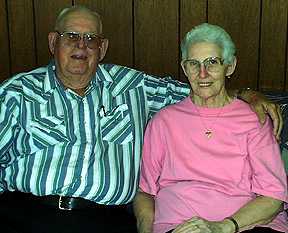
Duane and Dorothy Ann Corporon....married 57 years
|
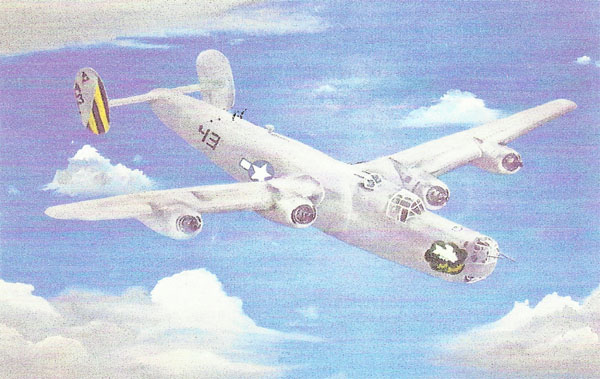
Drawing of Fast Freight done by, Duanes Granddaughter, Nicole Corporon
|
|
